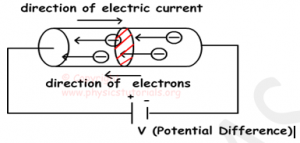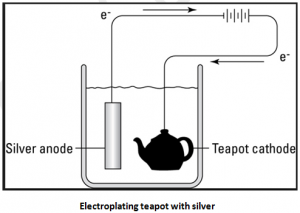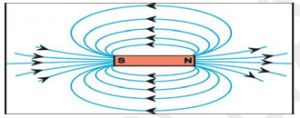An electric current is a flow of electric charge. In electric circuits this charge is often carried by moving electrons in a wire. It can also be carried by ions in an electrolyte, or by both ions and electrons such as in an ionized gas (plasma). Electric current is measured using a device called an ammeter.

Chemical effect: The passage of an electric current through a liquid causes chemical changes. This process is known as electrolysis. Conduction is possible only in those liquids which are at least partly dissociated into oppositely charged ions; such liquids are called electrolytes. Solutions of many inorganic chemical compounds (e.g. common salt, sulphuric acid, etc.) are examples of this type of liquid.

Electroplating teapot with silver
Electroplating is a common application of electrolysis. It consists of putting a layer of one metal on top of another by means of electricity. Cutlery and jewellery items are often silver plated – they have the appearance of silver but are much less expensive.
Magnetic effect: The magnetic effect of electric current is known as electromagnetic effect. It is observed that when a compass is brought near a current carrying conductor the needle of compass gets deflected because of flow of electricity. This shows that electric current produces a magnetic effect.

The magnetic effect of an electric current has many applications, e.g. in electromagnets, electromagnetic relays, loudspeakers, electric motors, ammeters, voltmeters, etc.
Thermal effect: If an electric circuit is purely resistive (only resistors are connected to a battery), the energy from the source continually gets dissipated totally in the form of heat. This effect is called as heating effect of electric current and it is effectively utilized in heater, electric iron, electric toaster, etc. Due to the wires having electrical resistance, which means that they resist the motion of electrons, the electrons bump into atoms on the outside of the wire, and some of their kinetic energy is given to the atoms as thermal energy. This thermal energy causes the wire to heat up.
UKPCS Mains Study Material subject wise
The notes are strictly as per UKPCS syllabus (topic wise):
Individual Polity Cost: Rs. 1500/- (including shipping)
Individual S&T Cost: Rs. 1500/- (including shipping)
Individual Geography Cost: Rs. 1500/- (including shipping)
Individual Economics Cost: Rs. 1000/- (including shipping)
Individual Ethics Cost: Rs. 1000/- (including shipping)
Individual History Cost: Rs. 1500/- (including shipping)
- UKPCS Mains Mock Test Series: Lower + Upper Combo - July 2, 2025
- UKPCS 2026 Complete Prelims + Mains Course - June 21, 2025
- UKPCS Mains Lower Test Series 2025 - June 19, 2025
